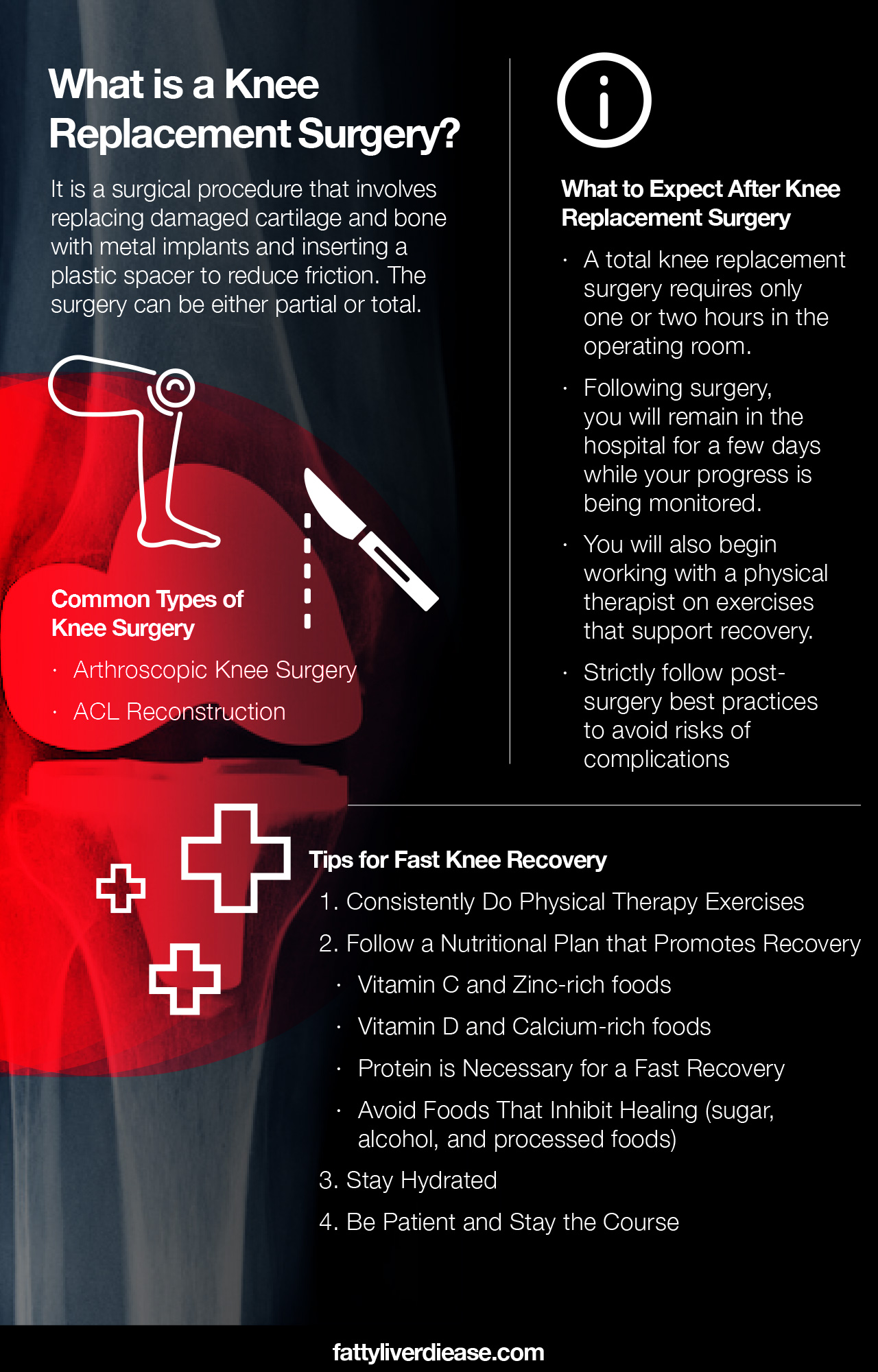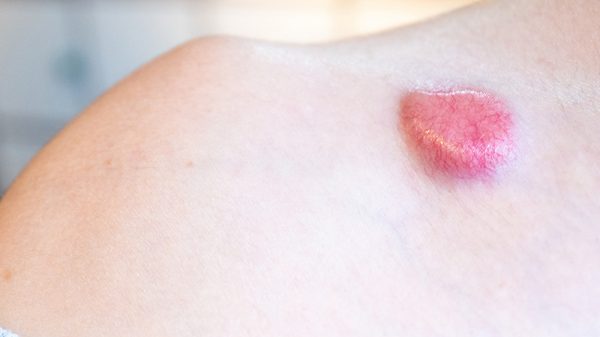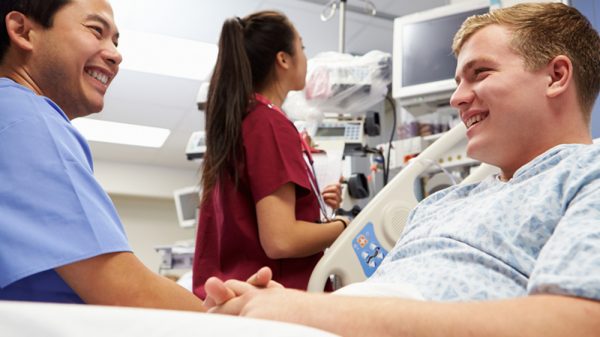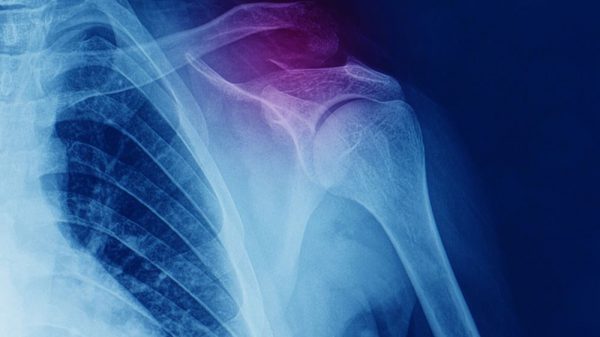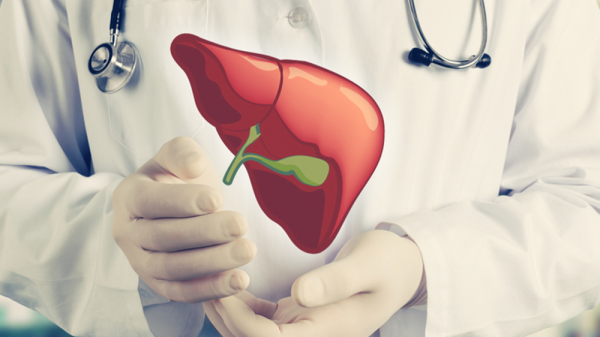If you’re preparing for or just had a knee surgery, you are probably excited about having a fully functioning knee that doesn’t hurt when you walk, keep you away from your favorite hobbies, or impact your day-to-day activities. The only thing standing in the way of this new life is the road to recovery. Is there any way to make this healing process faster? The answer is yes: physical therapy and nutrition are the critical components to ensuring a quick and complete recovery.
Common Types of Knee Surgery
Let’s first take a look at the most common types of knee surgery. It’s important to note that for all knee surgeries, recovery time will be dependent on the extent of damage and type of surgery. Some patients are engaging in normal activities after a few days; however, full recovery including the ability to participate in high-impact activities may take many months.
Arthroscopic Knee Surgery
Though x-rays help identify and diagnose a knee problem, arthroscopic surgery tends to be more accurate. During this surgical procedure, instruments called arthroscopes are inserted through small incisions in the patient’s knee area. Arthroscopes use advanced technology to reflect images onto a larger screen, which allows the orthopedic surgeon to detect disease, injury, and inflammation in the knee joint.
Arthroscopic procedures may be coupled with reparative procedures after the cause of damage is identified. For example, microfracture knee surgery uses an arthroscope when repairing cartilage -the soft tissue that protects bones from rubbing together and creating friction. A surgeon will make small punctures in the surrounding bone, which allows bone marrow cells to synthesize healthy cartilage. The surgeon may also use stitches to repair tears in the meniscus – a specific area of cartilage. Arthroscopic knee surgery recovery time is relatively short since it is a minimally invasive procedure.
ACL Reconstruction
ACL tears are very common among athletes of all levels, particularly in high-impact sports that place significant stress on the knees, such as football. The ACL – or the anterior cruciate ligament – connects the thigh bone and shin bone. During ACL reconstruction surgery, an orthopedic surgeon uses a graft taken from another tendon in the patient’s body. The graft is then used to repair the tear and is held in place with screws.
Knee Replacement
Knee replacements can be either partial or total. Partial knee replacement is recommended when knee damage is limited to only one specific part of the knee. However, severe damage generally impacts the entire knee joint, making total knee replacements more common. Osteoarthritis, rheumatoid arthritis, and injury-related arthritis are the most common causes of knee joint replacements. The surgical procedure involves replacing damaged cartilage and bone with metal implants and inserting a plastic spacer to reduce friction. A total knee replacement is the most extensive and invasive knee surgery you can have.
What to Expect After Knee Replacement Surgery
Surprisingly, total knee replacement surgery requires only one or two hours in the operating room. Following surgery, you will remain in the hospital for a few days while doctors and nurses administer pain medication and monitor your progress. You will also begin working with a physical therapist who will advise you on helpful exercises that support recovery.
Medical professionals will also guide you in post-surgery best practices, including how to reduce the risk of complications. They will also show you how to reduce swelling after knee surgery by applying ice, and they may prescribe anti-inflammatory medications.
What happens when you are let loose from the hospital to continue your healing at home? Physical therapy and optimal nutrition are the underpinnings of a quick and successful recovery. Many of these recommendations for recovery after knee replacement surgery apply to postoperative care for other knee surgeries as well.
Consistently Do Physical Therapy Exercises
A common misconception is that just resting and letting your body do its thing will result in full recovery. This is not the case; though you would still recover, the outcome would probably be a stiff knee with restricted movement. Specialized exercises throughout all stages of healing are critical to restoring full function and range of motion in your new knee.
Reducing Scar Tissue
Though knee replacements ultimately relieve pain and restore quality of life for individuals with damaged knees, your body initially reacts to the surgery in the same way it would react to an injury. Your cells must work overtime to repair and rebuild muscle, bone, cartilage, and other tissues. Along with these repairs, hardened scar tissue may form and impede joint movement. To help prevent scar tissue formation, it’s important to start leg and knee exercises as soon as possible.
Preventing Blood Clots
Being completely sedentary after surgery causes your blood to pool, especially in your legs. This can lead to blood clots, which can travel to other areas of your body, cut off circulation, and lead to oxygen deprivation and tissue damage. Blood clots can be avoided by engaging in movements and exercises approved by your doctor, to increase circulation and restore function to your new joint. Common exercises to reduce the likelihood of blood clots include leg raises, ankle pumps, and knee bends.
Muscle Strength
Physical therapy exercises also focus on building up strength in your leg muscles. Strong muscles create a support system that takes pressure off of your healing knee. Exercises will get increasingly difficult as your new knee heals. You will start by slowly walking with support from crutches or a walker. After a few weeks, you will be able to put more weight on your knee while walking. In later stages of recovery, you can begin to do activities that test your flexibility and endurance like climbing stairs and peddling on a stationary bike.
Follow a Nutritional Plan that Promotes Recovery
Under normal circumstances, billions of cellular processes are happening throughout your body that require nutrients and energy. But when repairing tissues, key immune system players like cytokines and growth factors are activated, and our body’s demand for complete and quality nutrition is even higher. Eating the right foods during recovery are also important for preventing complications like infection.
Certain nutrients are critical for a quick and successful recovery:
- Vitamin C and Zinc: Both of these are necessary for immune function during healing, and Knee replacements is also needed to repair tendons and ligaments. Citrus fruits, sweet potato, red peppers, brussels sprouts, spinach, and broccoli are rich sources of vitamin C. Beef, chicken, crab, oysters, beans, hemp seeds, and pumpkin seeds contain zinc.
- Vitamin D and Calcium: Vitamin D helps the immune system function efficiently and is a potent anti-inflammatory and antimicrobial agent. Adequate calcium intake is important to support bone repair and is needed for the absorption of vitamin D. Vitamin D is found in eggs, fatty fish, and cheese, and is also synthesized after sun exposure. Milk, soy milk, yogurt, spinach, broccoli, and cabbage are rich in calcium.
Protein is Necessary for a Fast Recovery
Eating enough protein ensures that you are providing your body with amino acids. Amino acids are critical for a vast array of cellular processes, including muscle growth. Your body needs 20 different amino acids to function properly and can synthesize 11 of them through physiological processes.
The remaining nine amino acids are called “essential,” because they need to be acquired from food. These essential amino acids are histidine, isoleucine, leucine, lysine, methionine, phenylalanine, threonine, tryptophan, and valine. Protein sources that provide these amino acids include meat, eggs, nuts, seeds, dairy products, and quinoa.
Amino acids have biochemically specialized functions:
- Isoleucine, leucine, and valine are crucial for muscle development, wound healing, and immune system response
- Tryptophan, histidine, and phenylalanine are important in building neurotransmitters that regulate your sleep cycle and mood
- Lysine and methionine help with mineral absorption and tissue repair
- Threonine supports immune functions and is a building block for tendons and ligaments
Because amino acids play such a big part in healing and muscle growth, they are essential for a quick recovery. Research also shows that amino acids support the post-surgery healing process. A study investigating 39 adults after knee replacement surgery revealed that supplementing with essential amino acids helped patients retain muscle volume. Furthermore, research on animal models shows that amino acid deficiency can lead to disruptions in protein synthesis and cell growth.
Avoid Foods That Inhibit Healing
When recovering from surgery, avoiding sugar, alcohol, and processed foods is the way to go. Excess sugar is hard on your liver and can throw off your body’s glucose levels. Chemicals like alcohol and those found in processed foods divert your body’s energy and resources from healing your knee to processing toxins. Your body also has a difficult time extracting nutrients from processed foods, so it’s important to stick to whole foods like meats, vegetables, and whole grains.
Stay Hydrated
With all of this talk about proper nutrition, it’s easy to forget about the simple things – like drinking enough water! Adequate water intake keeps your blood volume up so that essential nutrients reach all areas of the body, especially those areas involved in the healing process. Water is also important for flushing toxins out of the body and keeping cellular functions operating smoothly.
Be Patient and Stay the Course
Recovering from knee surgery can be a long and frustrating process. While it’s important to do recommended physical therapy exercises, don’t overexert yourself. Pushing your knee beyond what it can handle may risk causing damage and set you back in your recovery goals. Following the regimen set by your doctor and physical therapist and optimizing nutrition will help you achieve the fastest and most successful recovery possible. Stay consistent and keep your eye on the prize – a fully functioning knee that allows you to partake in all of the activities you enjoy.
